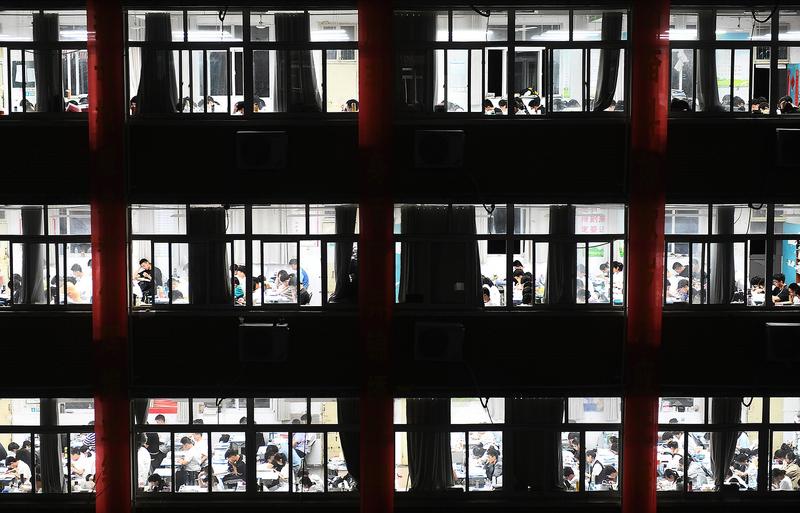Measures taken to ensure students can sit national college entrance exam
 Graduating students prepare for the gaokao, or national college entrance exam, at Fuyang No 1 Middle School in Fuyang, Anhui province, on Monday night. (WANG BIAO / FOR CHINA DAILY)
Graduating students prepare for the gaokao, or national college entrance exam, at Fuyang No 1 Middle School in Fuyang, Anhui province, on Monday night. (WANG BIAO / FOR CHINA DAILY)
With the annual gaokao, or national college entrance exam, approaching, the education commissions of provinces, regions and cities nationwide, especially those still battling COVID-19 outbreaks, are rolling out measures to reduce the impact of the epidemic on one of the most important exams in China.
Shanghai, where the exam has been delayed because of the epidemic, will hold its exams from July 7 to 9. It has set up examination rooms at places of medical observation, so that students who are still quarantined as COVID-19 cases or asymptomatic infections at the time when the exam is held will be able to sit the exam.
These examination rooms have been transformed into ones with medical facilities-like makeshift hospitals-and surveillance cameras and wireless signal jammers have also been installed to curb cheating during the exam.
The city has also made use of big data technology to comb through students' health codes every day to detect those with any abnormalities to be able to take quick action accordingly.
In Beijing, where 54,000 students will take the exam from June 7 to 10, about 100 regular exam sites are set up for students.
For those in locked-down areas, each of them will have an exam room of their own. Those in controlled areas will share an exam room, but their seats will be placed apart at a distance of at least two meters, Li Yi, spokesman of the Beijing Education Commission, told a news conference on Sunday.
Backup exam rooms have also been set up, and will be put into use if the epidemic worsens prior to the exam, he said.
During an inspection in Beijing on Monday, Vice-Premier Sun Chunlan requested health monitoring and nucleic acid tests for examinees and invigilators be well arranged, and staff members as well as goods and materials for prevention and control of the epidemic be in place to ensure the safety and health of students and teachers.
The number of students registered to take this year's national college entrance exam has hit a record of 11.93 million, and the number of invigilators has reached 1.02 million, making the exam the largest collective activity before the 20th National Congress of the Communist Party of China, she noted.
So far, the national situation for prevention and control of the COVID-19 epidemic has seen steady improvements, creating conditions for organizing the national college entrance exam, she said.
Because of the epidemic, students who will take the exam this year have spent more time at home preparing for the exam than those in previous years, and face a greater workload and mental pressure, Sun said.
Conditions must be created to ensure these students can return to school and receive guidance from their teachers before the exam, so that they can take the exam at their best physical and mental condition, she said.


